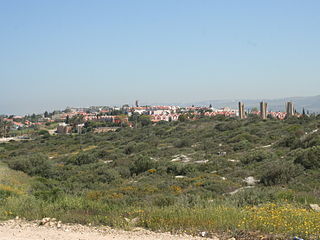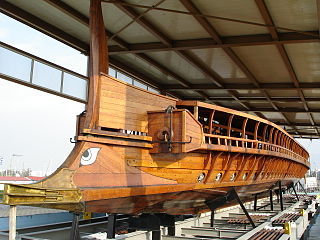Atlit or Athlit may refer to:
An animal is a multicellular, eukaryotic organism of the kingdom Animalia or Metazoa.
Jericho is a city, populated since ancient times, in the West Bank, Palestine.
A triangle is a geometric shape with three sides. Triangle may also refer to:

Atlit Yam is an ancient submerged Neolithic village off the coast of Atlit, Israel. It has been carbon-dated as to be between 8,900 and 8,300 years old. Among the features of the 10-acre site is a stone circle.

The Atlit detainee camp was a concentration camp established by the authorities of Mandatory Palestine in the late 1930s on what is now the Israeli coastal plain, 20 kilometres (12 mi) south of Haifa. Under British rule, it was primarily used to hold Jews and Arabs who were in administrative detention; it largely held Jewish immigrants who did not possess official entry permits. Tens of thousands of Jewish refugees were interned at the camp, which was surrounded by barbed wire and watchtowers.

Atlit is a coastal town located south of Haifa, Israel. The community is in the Hof HaCarmel Regional Council in the Haifa District of Israel.
Mahal may refer to:
A diary is a form of personal journal.

Atlit railway station is an Israel Railways passenger station serving the town of Atlit as well as the surrounding rural communities and military bases.
A teddy bear is a stuffed toy.

Château Pèlerin, also known as Atlit, is a Crusader fortress and fortified town located about 2 kilometres (1.2 mi) north of the modern Israeli town of Atlit on the northern coast of Israel, about 13 kilometres (8.1 mi) south of Haifa.

A ram was a weapon fitted to varied types of ships, dating back to antiquity. The weapon comprised an underwater prolongation of the bow of the ship to form an armoured beak, usually between 2 and 4 meters (6–12 ft) in length. This would be driven into the hull of an enemy ship to puncture, sink or disable it.

Megadim is a moshav in northern Israel. Located on the Mediterranean coast near Atlit and Highway 4, about 12 kilometres south of Haifa, it falls under the jurisdiction of Hof HaCarmel Regional Council. In 2021 it had a population of 1,388.

Le Destroit is a ruined medieval fortified road station, built by the Templars of the Crusader Kingdom of Jerusalem in the early 12th century CE, located on the Mediterranean shore near a site where they later built the Chateau Pelerin castle, today close to the modern town of Atlit, Israel.
Yes or YES may refer to:

Atlit naval base is a classified Israeli Navy base on the northern Mediterranean coast of Israel. The base is home to Shayetet 13, Israel's naval commando unit. Within its grounds stands Château Pèlerin, a medieval crusader fortress currently closed to the public.

The Immigrant camps in Israel were temporary refugee absorption camps, meant to provide accommodation for the large influx of Jewish refugees and new Olim arriving to Mandatory Palestine and later the independent State of Israel, since early 1947. The tent camps first accommodated Holocaust survivors from Europe, and later largely Jewish refugees from Middle East and North Africa. By early 1950, immigrant camps were converted into Transition Camps, where living conditions became better and tin dwellings replaced tents.
The Rafah massacre occurred on November 12, 1956, during Israel's occupation of the Sinai Peninsula and Gaza Protectorate following the Suez Crisis. The town of Rafah, lying on the Egypt–Gaza border, had been one of two invasion points during the initial incursion by the Israel Defense Forces into the Strip on November 1. As with the earlier Khan Yunis massacre, circumstances surrounding the events which led to the deaths of approximately 111 residents of Rafah and the nearby refugee camp are highly disputed, with Israel neither denying nor acknowledging any wrongdoing, while admitting that a number of refugees were killed during a screening operation. Refugees, it is also claimed, continued to resist the occupying army.

Atlit is a 2014 Franco-Israeli drama film written and directed by Shirel Amitaï. It stars Géraldine Nakache, Judith Chemla and Yaël Abecassis.